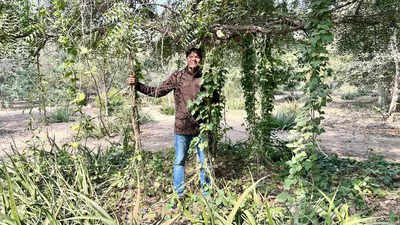- News
- Climate-resilient urban forest offers hope amid ‘gaps’ in heat action plan
Climate-resilient urban forest offers hope amid ‘gaps’ in heat action plan
Bathinda: Amid the backdrop of the Indian Meteorological Department (IMD) forecasting an increase in the number of heatwave days between April and June, a recent report has raised alarm about the shortcomings of India's heat action plans.
"Is India ready for a warming world? How heat resilience measures are being implemented for 11% of India's urban population in some of its most at-risk cities," released by think tank Sustainable Futures Collaborative, involving experts from Harvard University, King's College London, and other global institutions, has highlighted a critical oversight: the lack of green infrastructure — urban forests, green corridors, and public green spaces—capable of providing natural cooling and climate resilience. However, an unexpected solution has emerged in one of the driest corners of the country — Bikaner, Rajasthan.
Shyam Sunder Jyani, associate professor, Government Dungar College in Bikaner, has not only created a forest but has also cultivated a model of climate resilience.
Jyani began transforming 16 acres of barren institutional land into a thriving green space in 2013. Without any financial support from the college or govt, he invested his personal salary into the project, which has since blossomed into a flourishing urban forest with more than 3,000 trees across 90 species.
A standout initiative within this green space is the public nursery named after Dev Jasnath, a medieval eco-spiritual leader. The nursery, which distributes thousands of saplings free of charge every year, has become a hub for community engagement. In 2023 alone, over 21,000 saplings were distributed to local students, villages, and the Indian Army. Many of these saplings were sent to remote areas like Barmer in western Rajasthan, contributing to wider ecological restoration efforts.
The impact of Jyani's work has not gone unnoticed. The Nature Positive Universities Network—a global initiative led by the University of Oxford and the UN Environment Programme—has recognised the institutional forest as a model of climate resilience. Last year, Jyani was celebrated as a Staff Champion under this initiative, underscoring the global significance of his work in shaping sustainable solutions for the future.
MSID:: 120486215 413 |

About the Author
Neel KamalEnd of Article
Follow Us On Social Media








